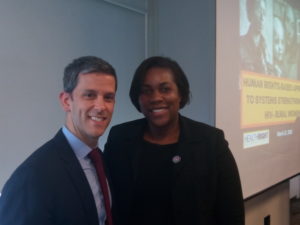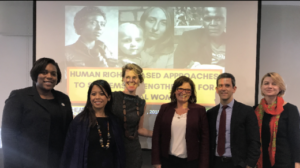Disclaimer: The views and opinions expressed in this piece are the author’s and do not necessarily represent the position of Positive Women’s Network – USA.  April 03, 2018
April 03, 2018
by: Shyronn Jones, PWN-USA S.C.A.T. Rep/PWN-USA Policy Fellow
UNITED NATIONS COMMISSION ON THE STATUS OF WOMEN (CSW62) organized by THE NGO COMMITTEE ON THE STATUS OF WOMEN NEW YORK – The 62nd Session of the Commission on the Status of Women was held March 11-23, 2018 at 777 United Nations Plaza in New York, NY. There were over 200 parallel events with the priority subject theme of “Challenges and Opportunities in Achieving Gender Equality and the Empowerment of Rural Women and Girls”, including rural women and girls with disabilities and those who are HIV-positive who are often left behind. The CSW62 review theme focused on “Participation and Access of Women to the Media, and information and communication technologies and their impact on and use as an instrument for the advancement and empowerment of women and girls”.
The CSW is instrumental in promoting women’s rights, documenting the reality of women’s lives throughout the world, and shaping global standards on gender equality and the empowerment of women. The last time rural women were a subject of the priority theme was at CSW56, and there was no outcome document. During that time the voices of rural women were not heard because others spoke for them. At CSW62 they intended to rectify that and succeeded on Thursday March 22, 2018 with the support of Positive Women’s Network-USA (PWN-USA) and HealthRight International. I (a rural woman living with HIV) had a seat at the table and engaged in discussions that represented rural women living with HIV in the United States of America. This was my first ever experience as a panelist and it was everything I hoped and dreamed. As a Strategic Communications Action Team Workgroup Member and Policy Fellow with PWN-USA, an organization which applies a gender lens to the domestic HIV epidemic and is grounded in social justice and human rights, I was highly prepared for this level of involvement.
The forum I participated in was titled “HUMAN RIGHTS-BASED APPROACHES TO SYSTEMS STRENGTHENING FOR HIV+ RURAL WOMEN”. The discussions explored human rights-based approaches to HIV programming as a pathway to reducing health and gender inequities among rural women. This event focused on the realities that rural women and girls living with HIV often face stigma and discrimination. With limited access to healthcare, they are often left rendered unable to exercise their right to health. By integrating human rights-based approaches into HIV programming, rural women and girls will be better able to claim their right to health. Increased knowledge of rights empowers women to advocate for better healthcare and gender equity. Globally, rural women and girls living with HIV are unable to consistently access quality healthcare. In particular, the availability of HIV prevention, treatment and care remains inconsistent with little resources and high staff attrition. States struggle with ensuring the right to health for rural communities, especially for HIV affected individuals.
The panelists explored various multi-sectoral strategies for rural systems strengthening and each presenter shared case examples of how rights-based approaches and the AAAQ model have been integrated into HIV programming. Focused case studies from Jennifer Carpenter of Pamoja Tunaweza who focused on HIV & cervical cancer (Treatment and diagnosis using mobile phones); Halyna Skipalska of Ukrainian Foundation for Public Health/ HealthRight Ukraine who focused on HIV & GBV (Drop-in centers, shelters, mobile teams); and Shyronn Jones, Positive Women’s Network – USA who focused on HIV policy advocacy. See my presentation here, it covered the landscape for rural HIV+ women in my region, aspects of the right to health/AAAQ model that reflects PWN-USA’s work with/for HIV+ rural women, described PWN-USA efforts to address HIV+ women’s needs, promising practices for HIV prevention, treatment and care among rural women and how the rights-based approach informed PWN-USA broader work.
The presentation was followed by a Q&A, which I discussed how PWN-USA integrates government accountability into its programming, What is the role of the public and private partnerships in supporting HIV+ rural women? How can we use innovative platforms like digital technology to address the right to health for rural HIV+ women? What are some lessons learned from using a human rights based approach to address HIV+ rural women needs? I felt most comfortable during the Q & A portion. I answered every question from the moderator and most questions from the audience. The audience gained a better understanding of how to use the right to health framework as a tool for ensuring gender equity and health rights for rural women and girls.
My advice to myself and other women living with HIV is to stand in confidence that your lived experiences and the experiences of others you witness is worthy of being told. When presenting information allow yourself, be your unique self and use words you commonly use. Lastly, enjoy your time presenting and reflect on the moments where your presentation was exceptionally good.
I’m extremely thankful to HealthRight International w/ SPECIAL EMPHASIS to Peter Navario, Executive Director and Theresa Castillo, WCH Program Director for HealthRight International for sponsoring this event; Emily Holzman from NYU; Emily Filner-Wilson, Human Rights Technical Advisor for UNFPA; PWN-USA for increasing my ability to engage effectively in federal policy and advocacy w/ SPECIAL EMPHASIS given to Naina Khanna Executive Director & Jennie Smith-Camejo Director of Communications; my aunts Maxine Horne-Binyard & Merry Jones for attending and loving me and my advocacy work; my energetic advocate-friend Robin Tucker for his advocacy with VOCAL-NY and taking pictures; Theodore “TED” Kerr for Past- Present- and FUTURE use of art to confront The American JUSTICE System. I’m looking forward to our upcoming collaborative art piece “Walls Turned Sideways” at the Contemporary Arts Museum in Houston, Texas from August 25th, 2018 – January 06,2019. Thank you to the Wonderful Panelists Jennifer Carpenter, Emilie Filmer, Halyna Skipalska, the Volunteer NYU Students, the Event Attendees and a special thank you to iknowAwareness Facebook members for their moral support.
Please check out The United Nations Toolkit on The Right to Health www.ohchr.org/EN/Issues/ESCR/Pages/Health.aspx, World Health Organization FACT SHEET on THE RIGHT TO HEALTH & AAAQ Model: Availability, Accessibility, Acceptability, Quality www.who.int/mediacentre/factsheets/fs323_en.pdf, HealthRight International www.healthright.org, Positive Women’s Network-USA www.pwn-usa.org, NGO CSW New York www.ngocsw.org and Subscribe to TED NEWSLETTER at TEDKERR.CLUB


